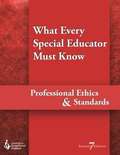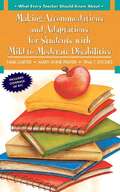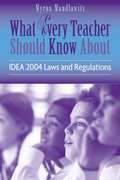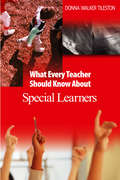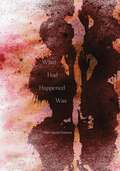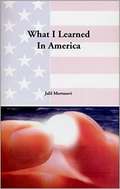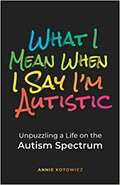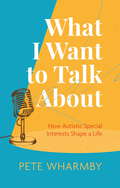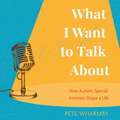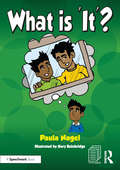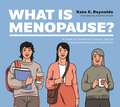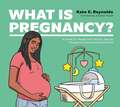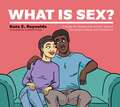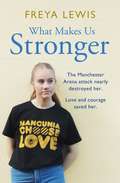- Table View
- List View
What Every Special Educator Must Know: Professional Ethics and Standards
by Council for Exceptional ChildrenCEC wrote the book on special education ... literally. CEC s famous red book details the ethics, standards, and guidelines for special education preparation and practice. Delineating both knowledge and skill sets and individual content standards, What Every Special Educator Must Know is an invaluable resource for special education administrators, institutional faculty developing curriculum, state policy makers evaluating licensure requirements, and special educators planning their professional growth.
What Every Teacher Should Know About Adaptations and Accommodations for Students with Mild to Moderate Disabilities
by Nari Carter Mary Anne Prater Tina T. DychesThis book serves as a guide and resource for general education teachers who teach students with mild to moderate disabilities. The book describes some difficulties students with disabilities experience in school and provides evidence-based teaching suggestions. Many of these suggestions may also benefit students without disabilities, as teachers differentiate instruction to meet the needs of all learners in the classroom.
What Every Teacher Should Know About IDEA 2004 Laws and Regulations
by Myrna MandlawitzA timely, jargon-free guide to the IDEA 2004 "laws and regs!" This handy booklet provides everything teachers and administrators should know about IDEA 2004 and its practical implications. It includes concise descriptions of the statutes, with a side-by-side comparison of the "old" regulations versus those just issued by the DOE in August 2006. A critical "top-drawer" reference for every educator! This clear, comprehensive, jargon-free resource outlines IDEA 2004 and its regulations and highlights their practical implications for practicing and pre-service teachers and administrators. The booklet provides concise descriptions of the aspects of the IDEA law every classroom teacher should know, with a side-by-side comparison of the "old" regulations versus those just issued in August 2006. When a little friendly background would help the reader better understand the practical implications of the regulations, an additional note is provided.
What Every Teacher Should Know About Special Learners
by Donna E. TilestonThis resource will help you differentiate content for special learners by identifying special programs and the laws and regulations that govern those programs.
What Had Happened Was
by Therí Alyce PickensIn her debut poetry collection, What Had Happened Was, Therí Alyce Pickens investigates the complex structures of Black storytelling. Addressing topics ranging from Black life, popular culture, and history to individual encounters with emotion, love, and chronic disability, Pickens crafts and questions the stories we tell ourselves about who we are and who we want to be. Throughout, Pickens mines the formal structures and the play of Black English within the lives and afterlives of Harriet Tubman, Mary J. Blige, Lil' Kim, Breonna Taylor, and figments of our collective imagination. Her singular poetic voice effortlessly flows between what she knows and what she’s heard and between everyday Black conversation and her work in cultural criticism and disability studies. Traveling at the speed of thought, Pickens explores a praxis of storytelling governed by the places where truths and fables kiss.
What I Learned in America
by Jalil MortazaviAMERICA, THE LAND OF OPPORTUNITY EVEN FOR A BLIND JOURNALIST FROM IRAN Throughout the world, millions of people believe if you are blind that this prevents you from traveling too far from home. Others, of course, may have these same beliefs but have just kept them to themselves. Thus begins Jalil Mortazavi's engaging and baffling experience as he tries to overcome such odd thinking. In his book, he tries to cover much of what he has learned in the hope that it will inspire, delight, and amuse his audience. Mortazavi is an Iranian-American journalist who lives in Brookline, Massachusetts. He works for the Persian-American Media Watch. He has also been associated with Persian Voice of Boston, 24-Hour Persian Radio based in California, and 24-Hour Persian TV [NI TV]. He has appeared on Imus in the Morning, and he has done some news commentary on National Public Radio's All Things Considered and on Talk of the Nation. In addition, Jalil enjoyed being a guest on a number of different television and radio talk shows WCV TV, American Radio Network in Baltimore, and radio stations WBZ, WHDH, WRKO, WROR, and WTTP. Mortazavi has also written for such publications as The Boston Globe, The Boston Herald, and The Brockton Enterprise.
What I Mean When I Say I'm Autistic: Unpuzzling a Life on the Autism Spectrum
by Annie KotowiczIn this intimate and insightful mix of memoir and manifesto, Annie Kotowicz invites you inside the mind of an autistic woman, sharing the trials and triumphs of a life before and after diagnosis. <P><P> How might it feel to be autistic? Why are autistic and non-autistic people so puzzling to one another? How does neuroscience explain the spectrum of autistic traits? And what could you discover about your own mind—neurotypical or neurodivergent—through learning about another? <P><P> Drawing on popular stories from her blog Neurobeautiful—along with memories never shared before—Annie Kotowicz has created a nuanced analysis of her autistic thinking, an engaging guide to autistic thriving, and a beautiful celebration of autistic brains. <P><P> What I Mean When I Say I’m Autistic will inspire autistic people and those who love them, offering help and hope to anyone seeking a deeper understanding of the autism spectrum.
What I Want to Talk About: How Autistic Special Interests Shape a Life
by Pete Wharmby'This book isn't a memoir. It is a love letter to the phenomenon of autistic hyperfixation.'In What I Want to Talk About popular autism advocate Pete Wharmby takes readers on a journey through his special interests, illuminating the challenges of autistic experience along the way. Funny, revealing, celebratory and powerful in equal measure, this is a book that will resonate with many, and which should be required reading for anyone who wants to understand autism with more accuracy and empathy.
What I Want to Talk About: How Autistic Special Interests Shape a Life
by Pete Wharmby'This book isn't a memoir. It is a love letter to the phenomenon of autistic hyperfixation.'A fascinating exploration of the autistic experience from leading advocate, Pete Wharmby. In What I Want to Talk About popular autism advocate Pete Wharmby takes listeners on a journey through his special interests, illuminating the challenges of autistic experience along the way. Funny, revealing, celebratory and powerful in equal measure, this is an audiobook that will resonate with many, and which should be required listening for anyone who wants to understand autism with more accuracy and empathy.(P)2022 Hodder & Stoughton Limited
What is it?: But What If...; Mind Reading; Stuck On A Loop; Waht Is It? (Rollercoaster Series)
by Paula NagelThis is a focus on low mood associated with bereavement. Sam feels low and fed up, but doesn't understand why he feels this way. Everyone else has an opinion on the change in his behaviour. His teacher thinks he is being lazy and can't be bothered to finish his work, his mum thinks he is moody and bad tempered, his friends think he is no fun any more and turning into a bore. Comments like, 'Cheer up it might never happen', ' What has got into you?' and 'Do you want to talk about it?' just upset him even more. He doesn't know what the 'it' is, that is making him feel this way. He didn't even feel this bad when his cousin died a year ago! When he is kept behind in class for not completing his work he tells the teacher how confused and sad he feels. Connections are made between his feelings and the looming anniversary of his cousin's death. Sam is helped to understand that thoughts and feelings associated with bereavement can come and go for a long time, and can cause strong emotions. He is shown how to notice and share his feelings and to think about things he can do when he feels this way. He makes a memory box so he can also remember all the happy things about his cousin. In the 'Let's talk about .sadness and loss,' section, feelings associated with bereavement and helpful coping strategies are shared. Paul Nagel has worked as an educational psychologist for 17 years. This has included working as a Lead Professional Educational Psychologist managing a traded service, as well as holding Senior Specialist posts for early years and disability. Over the years Paula has worked in multi agency teams within paediatric services, youth offending teams, Sure Start and an anti bullying service. She is currently Principal Educational Psychologist (North) for the national children's mental health charity, Place2Be. Before qualifying as an Educational Psychologist Paula was a primary school teacher. Gary Bainbridge is an artist, comics creator and secondary school Art, Photography and Media Studies teacher from Durham. He's best known for the North East based kitchen sink superhero comic Sugar Glider and the Newcastle-set crime fiction comic, Nightbus. Gary teaches at an academy in Northumberland.
What Is It Like to Be Me?: A Book About a Boy with Asperger's Syndrome
by Katarina Kompan Erzar Branka D Jurisic Tony Attwood Alenka Klemenc Ursa RozicJoin Greg, a young boy with Asperger's syndrome (AS), as he tells us all about the world as he sees and experiences it. We learn about all the things he loves, including his routine and numbers, as well as his special interest in batteries (he even has a rectangular one!). Greg also tells us about the things that he finds challenging, from a change in his beloved routine to reading facial expressions, and how these things can sometimes leave him upset and overwhelmed. By explaining the way he feels and how best to calm him down when it all gets too much, Greg helps us to understand AS and how it affects the way he views the people and objects around him. With comprehensive sections for parents and professionals on AS and the impact it can have on the family unit and life in the wider community, this charmingly illustrated book helps to increase awareness and understanding of Asperger's syndrome. It will be of interest to families of children with autism spectrum disorders, as well as teachers and other professionals working with children on the autism spectrum.
What Is Menopause?: A Guide for People with Autism, Special Educational Needs and Disabilities
by Kate E. ReynoldsThis carefully written and explicitly illustrated book provides an explanation of menopause for people with autism and special education needs and disabilities (SEND). It helps readers to understand the physical processes and symptoms of menopause, as well as important practical information, such as how to cope with the emotional and hormonal changes in menopause, complementary therapies and tips on how to effectively communicate your experiences to support networks and professionals such as, doctors and therapists.Menopause is rarely recognised or addressed with people who have autism, special educational needs and disabilities (SEND) yet it has a significant impact on their daily living. This book frankly explains what constitutes menopause, that it is part of the life course and can be actively managed. As part of the 'Healthy Loving, Healthy Living' series, this book is written in gender neutral and inclusive language.
What Is Pregnancy?: A Guide for People with Autism, Special Educational Needs and Disabilities (Healthy Loving, Healthy Living)
by Kate E. ReynoldsThis carefully written and illustrated book provides an explanation of pregnancy for people with autism and special education needs and disabilities (SEND). It helps readers to understand the physical processes of pregnancy, as well as important practical information, such as how to stay healthy in pregnancy, antenatal care, the role of the midwife and the involvement of partners.Many people with autism and SEND may want or plan to have children. Many women who have autism, special educational needs and disabilities (SEND) have poor experiences of prenatal and postnatal care and high levels of stress, anxiety and depression or do not disclose their pregnancy until far into their terms due to fears of forced termination. This book frankly explains pregnancy so that the reader has a clear understanding of what constitutes pregnancy, what happens during labour and is aware of their legal right to create a family.
What Is Sex?: A Guide for People with Autism, Special Educational Needs and Disabilities (Healthy Loving, Healthy Living)
by Kate E. ReynoldsThis carefully written and illustrated book provides an explanation of sex for people with autism and special education needs and disabilities (SEND). It helps readers to understand the physical processes as well as important issues such as consent and sexual safety, helping them to develop positive relationships.Many people with autism and SEND have or will have intimate relationships. Often sex is alluded to, rather than being carefully explored. This can create confusion around consent, sexual health, and pregnancy, and cause people to turn to dubious online information. This book frankly explains sex so that the reader has a clear understanding of what constitutes sex, knowledge of the proper names for sexual organs and sexual activities, and is aware of the potential physical consequences of having sex.
What Is Working Memory and Why Does It Matter?
by Annie StuartWhat Is Working Memory and Why Does It Matter?
What Katy Did (Katy #1)
by Susan CoolidgeTwelve-year-old Katy always planned to do a great many wonderful things but in the end did something she never planned at all. When life takes a turn, how will Katie respond? [please note: Misprints (and there are an excessive amount in this book, both spelling and punctuation) in original text preserved as dictated by copyright law.]
What Makes Me Special: A neurodiverse child's journey
by Claudia Rose AddeoThis children’s piece of literature can be read by children ages 4-9, but also welcomes readers of all ages who are among the neurodiverse community. This bright, colorful children’s book reflects the author’s childhood navigating a mainstream education system through the eyes of a neurodiverse learner. A very happy-go-lucky child shares all of the obstacles and gifts that come with being a neurodiverse learner and how that can appear in her everyday life. Whether it entails navigating sensory overload, demonstrating her creative talents, or receiving special education services, Claudia shares all of the unique aspects of her childhood that also relate to so many other children among the neurodiverse community. Though there are certainly times that Claudia can face challenges that appear overwhelming, this sensitive, kind, and optimistic little girl always manages to remind herself that hard work does pay off and understands that these are the qualities that make her special. Claudia reminds readers of all ages the importance of being kind and accepting of one another, as well as being able to recognize the many beautiful gifts neurodiverse learners possess that make them special!
What Makes Us Stronger
by Freya LewisThe Manchester Arena attack nearly destroyed her.Love and courage saved her.Freya Lewis was just three metres away from the terrorist who detonated the bomb at the Manchester arena on the night of 22nd May 2017. Her best friend Nell was tragically killed, but Freya - thrown forwards by the blast - somehow survived. She suffered 29 separate injuries, was in a coma for five days, and wheelchair-bound for three months.Yet just 12 months later, she was on her feet, running the Junior Great Manchester Run and raising £60,000 for the hospital that saved her. From her darkest moment, she found the determination to live life to the fullest, for herself, and for those who lost their lives.This is Freya's courageous story. But it is also the story of the amazing community that surrounded her, uplifted her, and ultimately saved her life.What Makes Us Stronger is a testament to the power of hope and positivity.
What Museum Guides Need to Know: Access for Blind and Visually Impaired Visitors
by Gerda Groff Laura GardnerThis book provides practical, easy-to-use suggestions on how to greet and assist blind and visually impaired visitors. It also covers aesthetics and visual impairment, legal requirements for accessibility, and resources. It includes a training outline for museum professionals, a bibliography on art and museum access for blind and visually impaired persons, and guidelines for preparing large print, braille, and cassette materials.
What of the Blind? A Survey of the Development and Scope of Present-Day Work with the Blind: Volume 1
by Helga LendeWhat of the Blind? is designed with a view to presenting in one single volume the experience and opinions of leaders in this specialized field. The material has been grouped so that the student may easily find the aspect of the subject in which he is especially interested. Following each chapter is a short reading list which will serve as a guide to further study.
